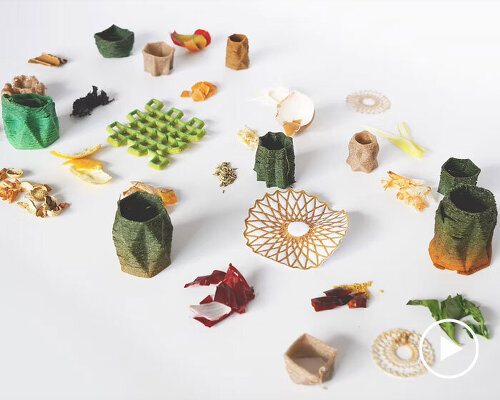FOODres.AI transforms food waste into functional objects
FOODres.AI is a desktop 3D printer developed by MIT graduates Biru Cao and Yiqing Wang that converts household food waste into functional objects using artificial intelligence. Integrating object recognition, material processing, and additive manufacturing, the system offers an alternative approach to domestic waste management through small-scale, circular design. The printer is equipped with a custom three-axis extrusion system and an automated material processing module. Kitchen scraps are processed into a printable bioplastic paste using a built-in heating and mixing mechanism. The material is then extruded into preselected forms such as coasters, containers, and simple decorative items.
A mobile application supports the system’s operation. It includes a self-trained object detection model that identifies types of food waste using the phone’s camera. Based on the detected material, the app suggests suitable ‘print recipes’ that account for the physical properties of the waste. The app also provides a library of design templates, and users have the option to upload custom models. The interface is designed for intuitive use, requiring minimal prior experience with 3D printing.
craft prints and the printing materials | all images courtesy of Biru Cao and Yiqing Wang
FOODres.AI 3D printer enables localized reuse of scraps
FOODres.AI, developed by designers Biru Cao and Yiqing Wang, originated as part of MIT’s IDEAS social innovation program and has since received continued institutional support. It was recognized with the iF Design Award (2025) and the Platinum A’ Design Award (2024–2025). The project situates itself within broader efforts to reduce food waste, an issue that accounts for up to 50 percent of household organic refuse in the United States.
Rather than diverting food waste exclusively to compost or landfill, the system enables localized material reuse through additive manufacturing. Its compact format allows for potential integration in domestic, educational, or small-scale workshop environments. The design emphasizes automation, modularity, and user accessibility, aligning with emerging practices in distributed production and sustainability. FOODres.AI proposes a material cycle in which organic waste can be repurposed into durable forms. The system supports experimentation and modular output while reinforcing behavioral change through direct interaction with waste transformation processes.
from AI detection to printed crafts
FOODres.AI printer
user interface of the mobile app
machine design
sharing the work on social media
project info:
name: FOODres.AI Printer
designers: Biru Cao, Yiqing Wang
designboom has received this project from our DIY submissions feature, where we welcome our readers to submit their own work for publication. see more project submissions from our readers here.
edited by: christina vergopoulou | designboom
The post AI-powered 3D printer transforms kitchen scraps into functional objects appeared first on designboom | architecture & design magazine.

